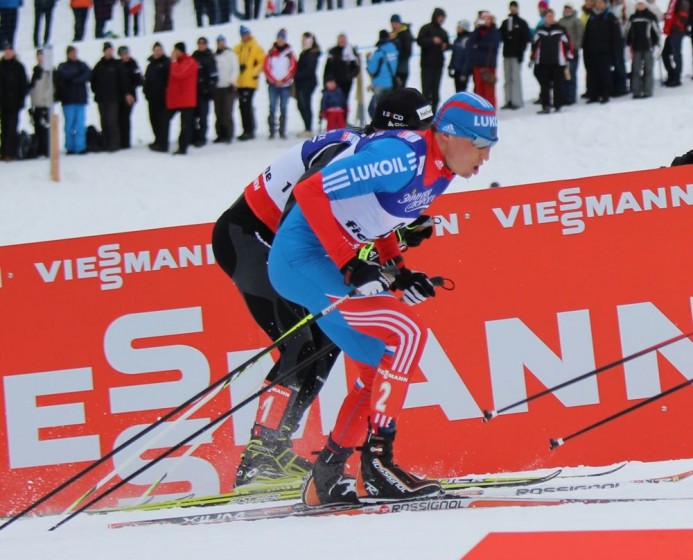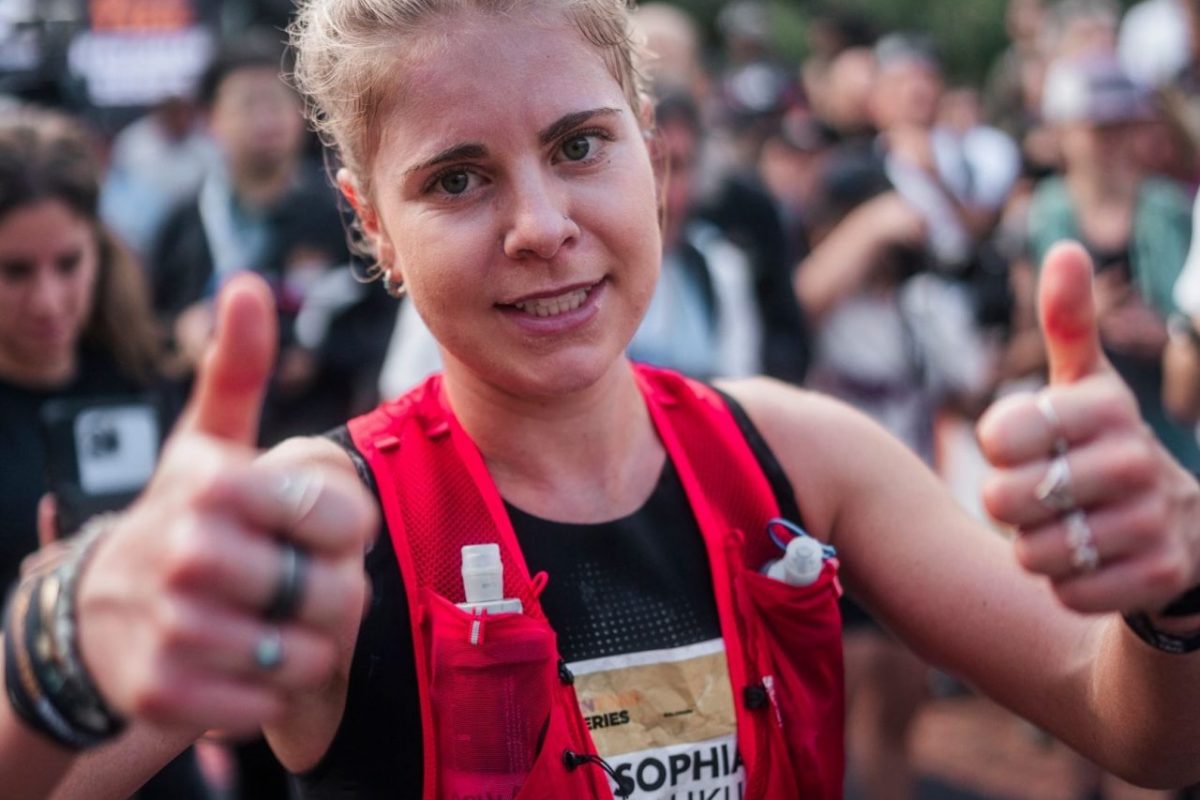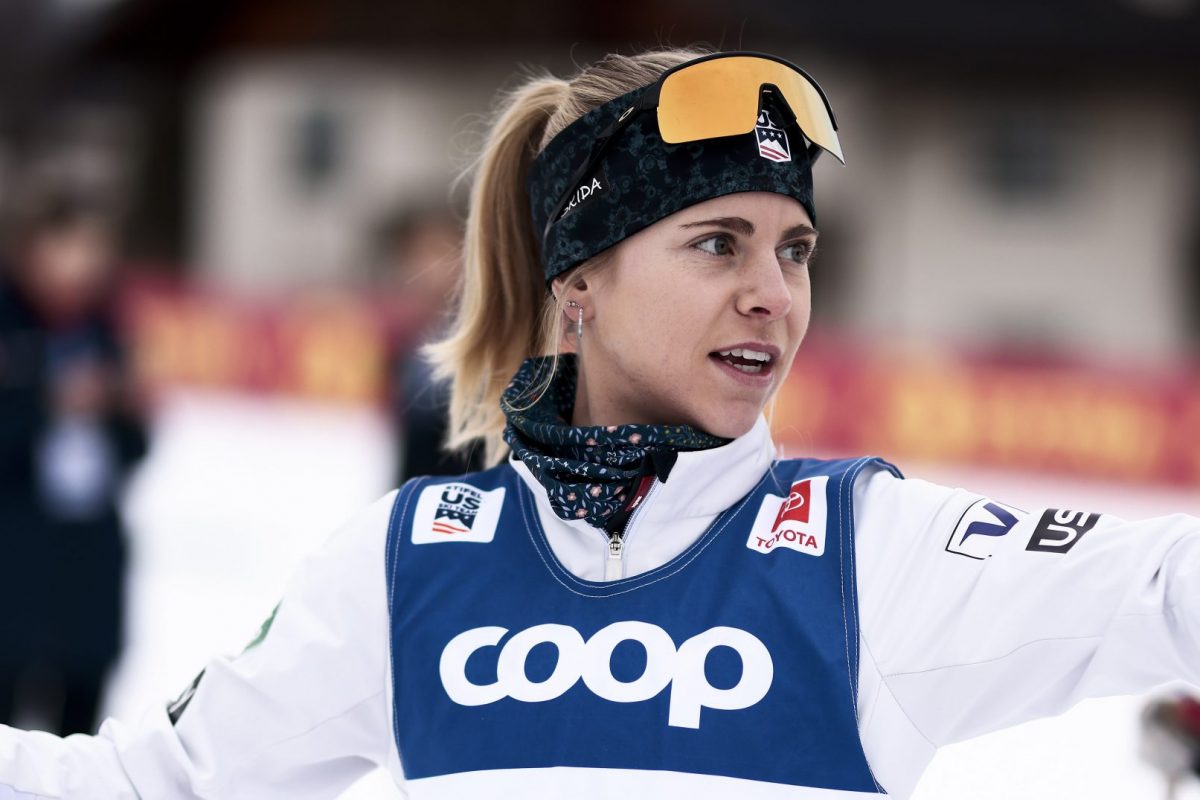
When suffering is in order, the mind is almost more important than the body in determining the outcome of a race.
On Saturday in Oslo, Norway, Alexander Legkov (RUS) triumphed on Holmenkollen’s notoriously brutal track, persevering through vicious pace changes, 2,000 meters of climbing, and warm, wet conditions.
“I feel great,” Legkov said afterwards. “It is a big victory for me after not so good World Championships. My plan was to control the pace and to save some energy for the final lap and attack in the stadium. It worked perfect and I had great skis as well.”
Legkov cross the line with his typical Russian reserve, belying the gravity of the moment. A win at Holmenkollen can make a career; for Legkov this achievement adds to a breakthrough season with an overall victory in the Tour de Ski and the top spot in the overall World Cup rankings before the finals in Stockholm and Falun, Sweden.
No longer a nearly-man, the stuttering Legkov of old has been replaced by an athlete that rises to the big occasion. His win at Holmenkollen is representative of his progression as a ski racer as he showed patience and bottomless stamina to overthrow the favorites.
The story line going into the competition was the presumed showdown between Dario Cologna (SUI) and Petter Northug (NOR), who were separated by a mere 23 points in the World Cup overall ranking.
In addition to the drama in the fight for the overall, the course designers added a few novel hijinks designed to disrupt the rhythm of the race. Athletes were allowed five ski exchanges instead of the usual three, and the decision to take new skis typically cost them between 20 and 30 seconds with the addition of a few extra meters before the pit.
What’s more, the rhythm of the race was affected by critical bonus sprints on each lap, which rewarded top athletes at each preem with precious World Cup points. And with Johan Olsson’s World Championship solo victory fresh in the minds of top competitors, the pack was less willing to cede too much of gap to breakaway attempts.
When the race got underway on the fabled course, Anders Soedergren (SWE) and a unknown Norwegian continental cup skier named Simen Sveen broke away in the first few kilometers and left the pack trailing in their wake. As they passed the 8.3 k mark they had 20 seconds in hand. The chasing pack never let the gap grow more than that, with the evergreen World Cup veteran Giorgio Di Centa (ITA) hauling them back.
By 14.2 k the two frontrunners had been absorbed, and the Russian duo of Chernousov and Legkov took up the donkey work, with Noah Hoffman (USA) making a notable appearance at the front of the pack.
Favorites Cologna and Northug didn’t much away, both opting to slide into the pack and stay relatively close to the front to monitor pace changes.
At the second of six 8.3 k laps most of the field elected to change skis, and Remo Fischer (SUI) and Curdin Pearl (SUI) pushed on, with the stocky Belarussian Michail Semenov tucked in just behind. One might have thought that the Swiss duo was employing team tactics to help Dario Cologna’s chances, but Cologna himself was the one who dragged the pack back to his teammates, preventing the group from idling into a middling pace.
While Fischer, Pearl, and Semenov pushed on from the front, Northug began to slip backwards. His positioning in mass starts is usually erratic, but he normally makes a point to stay in the top 20 to cover any surges at the front.
Not this time. Northug’s body language was labored, and he fell out of the top 30. The overall pace didn’t slacken, boosted by the work of Sjur Roethe (NOR) and Martin Johnsrud Sundby (NOR). Clearly team orders for Norway were every man for himself.
At the third intermediate sprint Legkov charged in just ahead of Cologna, and Roland Clara (ITA) collected bonus points for third. The bonus points on offer had an obvious affect on the race, as the resulting surges in pace caused some racers to blow up prematurely.
A group of seven athletes soon began to break away, with a surprising Johannes Duerr (AUS) keeping the pace high. The leaders seemed to sense weakness in the chasing pack and began to drive the screw. Behind them, ragged on Holmenkollen’s punishing slopes, Tord Asle Gjerdalen (NOR) and Northug struggled to close the gap. They had 26 seconds to make up on Duerr, and thanks to Gjerdalen’s ceaseless labors the gap decreased, and by the 31.7 kilometer split they were less than 20 seconds away from joining the front group.
By the time the leaders came through the stadium and took a well-earned feed, Gjerdalen and Northug were back in it. Now nine men strong, the group went into the exchange zone together and came out as one in no particular hurry.
Roland Clara kept the pace honest, taking the reins from Duerr all the way to the bonus sprint. The lead changed several times, with Petter Eliassen (NOR) in a sparkling form. Northug, Cologna, and Gjerdalen lingered at the back, and they clearly struggled with the pace. Cologna was the first to break and drifted backwards a few meters at a time with Gjerdalen, though the latter eventually found energy to reconnect with the leading group.
At the 39.2 k mark it was Eliassen, Legkov, and Sundby in the lead and they weren’t giving much away, their technique smooth and crisp. Behind Roethe began to falter, and with him, Northug.
Notably, on a hill moving toward the stadium Clara drove the pace and Northug began slipping further back. As they crested the hill Clara looked up to see who was around and saw Northug several meters detached behind him. Instead of pushing on he effectively stood up, and with him, the rest of the leaders. At the 44.6 k mark the leaders had 20.5 seconds on Northug, who was clearly suffering from his earlier effort to regain contact with the lead.
Eliassen and Legkov weren’t having any of it. They lept to the front, and on the penultimate hill leading into the stadium they strung the group out, making sure that the likes of Gjerdalen and Northug couldn’t make their way back on because of a careless race pace.
At the 47.5 k mark it was Eliassen driving from the front past the famous Holmenkollen ski jumping hill, with Clara and Legkov lurking just behind. hey stole a few glances backward to check on the progress of Northug and Gjerdalen, but didn’t up the tempo upon seeing them significantly detached. The difficulty of Holmenkollen’s steep pitches could be read in the weary body language of the front-runners as they entered the steep, wall-like climb out of the stadium.
The pace slowed at 48.4 kilometers and Ilia Chernousov (RUS), who had remained quietly attached at the back of the pack for most of the race, started to yo-yo, the elastic stretching to breaking as they crested the hill. Sensing weakness, Eliassen and Sundby punched it, with Legkov seemingly comfortable just behind.
The group stayed together leading into ‘Hellner Bakken,’ the famous climb leading into the stadium, and even Chernousov was able to dig deep and hang on. It was all to play for as they swung round into the stadium, and Eliassena and Sundby led the charge for the line in front of a roaring crowd feverishly waving Norwegian flags.
Legkov charged to the fore, attacking in a hop skate in the fashion of his beleaguered arch-rival Northug, distancing himself from Sundby and Chernousov. Legkov would never relinquish this gap, and glided in across the line to one of the most notable victories of his career in a time of 2:07.32.9.
Sundby coasted in just 1.2 seconds behind for an impressive second place, some consolation after a disappointing world championships marred by sickness. His result on Saturday was especially meaningful for him as lives a short way from the course.
“I can see my house from the highest point of the course at Frognersetern,” Sundby said. “I am training on these courses and it is always special to compete on Holmenkollen. I hoped for victory and wanted to be in front on Helnerbakken. My mind wanted to attack but my body did not respond. I had cramps going from my little thumb to the foot. I thought I would fall back to fifth place. At the end I took second place and I am happy.”
Third place went to Legkov’s compatriot, Chernousov, whom recovered from some tough moments leading into the stadium to finish in 2:07.34.8.
“No race on Holmenkollen is a piece of cake and today was not an exception,” Chernousov said. “My second pair of skis was not that fast and I was struggling to follow the guys. I am happy it was Alexander and me on the podium today.”
Eliassen had to settle for fourth position, a lifetime best, but a tough reward for all the work he did at the front, finishing in 2:07.35.4.
Roland Clara secured a commendable fifth place in 2:97.35.7. An exhausted Northug limped across the line in sixth position, 42 seconds behind Legkov. The result his fell short of expectations but it was enough for him to leapfrog Cologna in the overall world cup ranking, who had a miserable day and finished down in 19th position, a shocking 3:17.3 off the pace.
Despite Northug getting the better of Cologna, Legkov’s win moved him into first place in the overall world cup, with Northug a scant 12 points behind in second. Cologna dropped down to third place overall, six points behind Northug.
Legkov’s seminal victory earned him lasting reknown, the world cup lead, and a meeting with the king of Norway.
“I am happy to be in the World Cup lead but there are four competitions to go,” Legkov said. “Petter as well as Dario have been in a great shape and it will be difficult to keep the yellow bib until the end of the season.”



